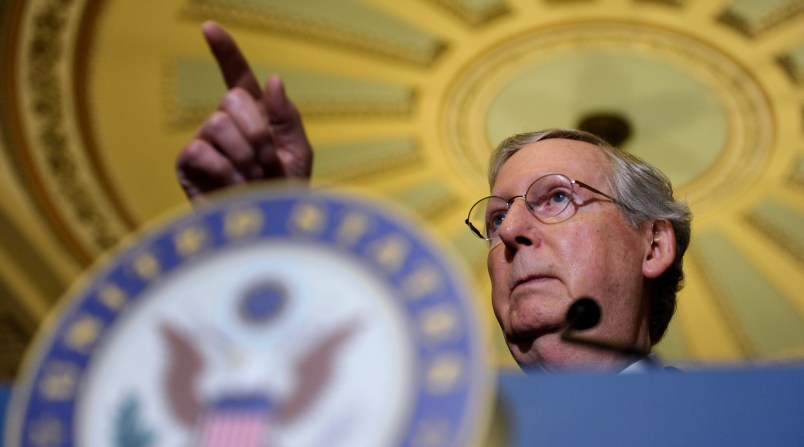Of the many ways Republicans might target Obamacare if they win the Senate this fall, at least one should have a decent chance of earning the approval of the White House: repealing the law’s employer mandate.
The employer mandate is supposed to require companies with more than 50 employees to provide health coverage to their workers or pay a fine. It’s unpopular with the business community, though the general public supports it.
If the GOP held the House and the Senate, insiders expect the employer mandate to be a likely target for their anti-Obamacare agenda. Sen. Orrin Hatch (R-UT), in line to assume control of the powerful Senate Finance Committee, has already introduced a repeal bill this Congress.
“If things were to turn, if Republicans were to take a simple majority, I think this would be one of the top things that Republicans would look at,” Amanda Austin, health policy expert for the National Federation of Independent Businesses, one of the groups involved in the lawsuit to overturn Obamacare and one major force behind the repeal effort, told TPM.
Senate GOP staffers acknowledged as much to TPM. “Absolutely. We will take whatever we can get when it comes to dismantling Obamacare,” one aide said.
But the difference between this and other legislative paths that Republicans might take — pushing for full repeal or repealing something more crucial to the law’s foundation like the individual mandate — is that a repeal of the employer mandate might be something the White House could actually stomach.
The Obama administration has already softened the mandate on its own, delaying it for a year and allowing medium-sized companies to avoid any penalties until 2016 at the behest of the business community. Policy experts generally agree that the mandate could be axed, and Obamacare would still function. RAND, a think tank, estimated that a one-year delay of the mandate would result in a relatively small decrease in the number of people covered: 300,000.
The White House isn’t openly speculating about how it’d handle a Republican Congress and its Obamacare agenda. Some insiders believe that it would block any changes to the law or else risk emboldening the GOP to undermine the law more and more.
But a repeal bill would almost certainly earn some Democratic support in the Senate — NFIB’s Austin said her group has already been in touch with moderates like Joe Manchin (D-WV) and Joe Donnelly (D-IN). The Obamacare “fixes” that a group of five Democratic senators introduced didn’t fully repeal the mandate, but did scale it back.
Even White House allies say the administration should at least consider allowing repeal in this scenario.
“It is expendable, but expensive to repeal,” Jonathan Gruber, an MIT economist who helped craft Obamacare, told TPM. “I think they should consider it if there is a pay-for.”
That is the key question: How would repeal be paid for? RAND estimated that a full repeal of the employer mandate would mean $149 billion in lost revenue over the next 10 years. There will also be new costs: CBO projected that a one-year delay of the mandate would result in $3 billion in new spending, mostly paying for tax subsidies of people who moved from employer coverage to HealthCare.gov.
Hatch’s bill, which attracted 30 Republican co-sponsors, didn’t include any means of making up the lost revenue. So if Gruber’s reasoning is shared by the White House, that will be an important puzzle for the GOP to solve if it wants to secure the rollback of at least one Obamacare mandate.






